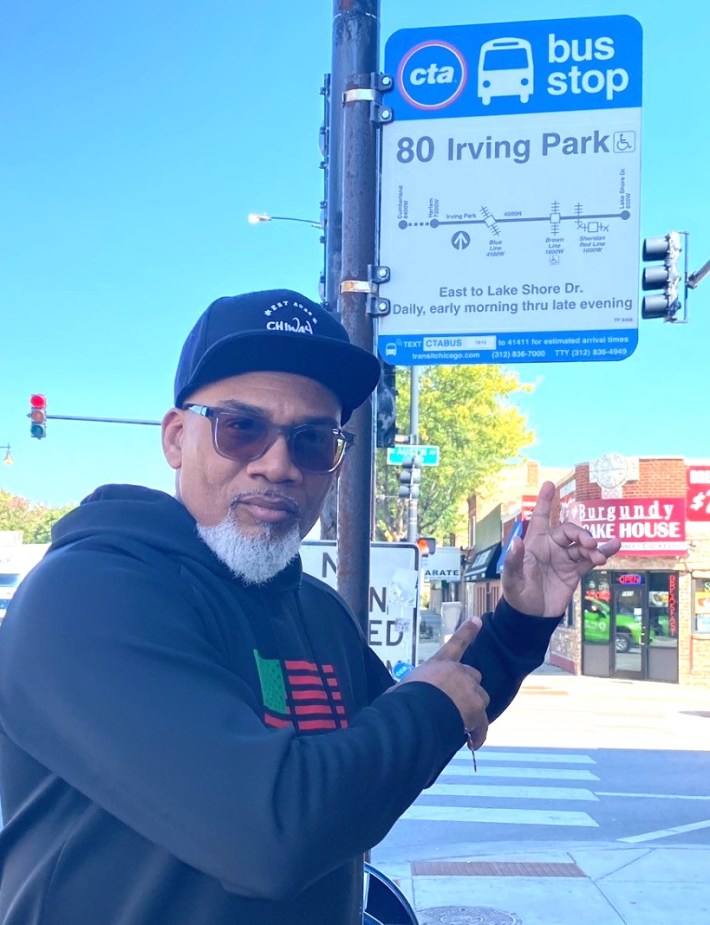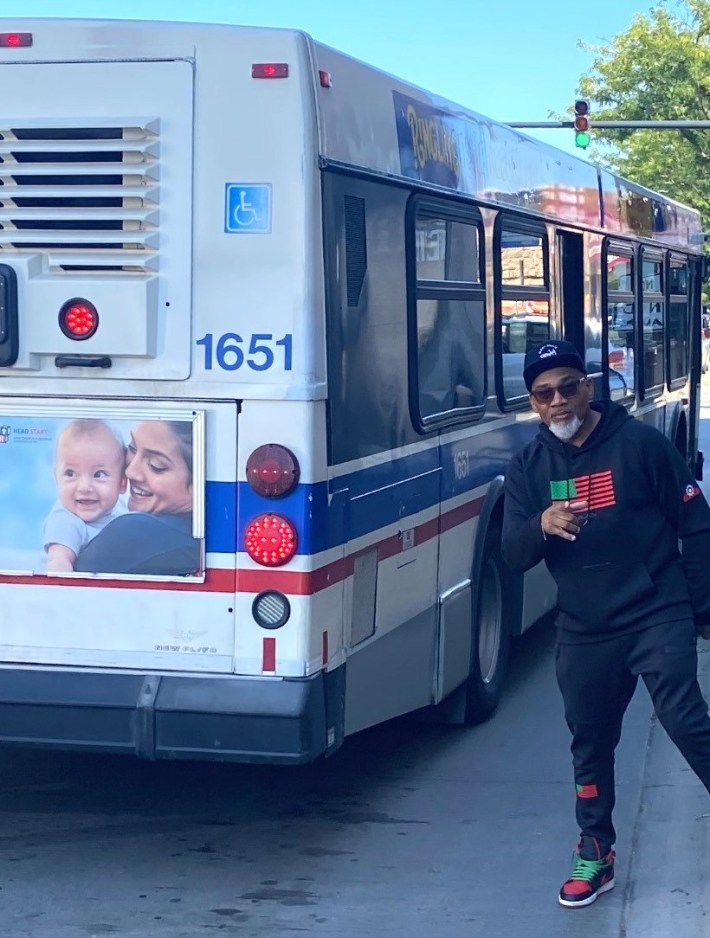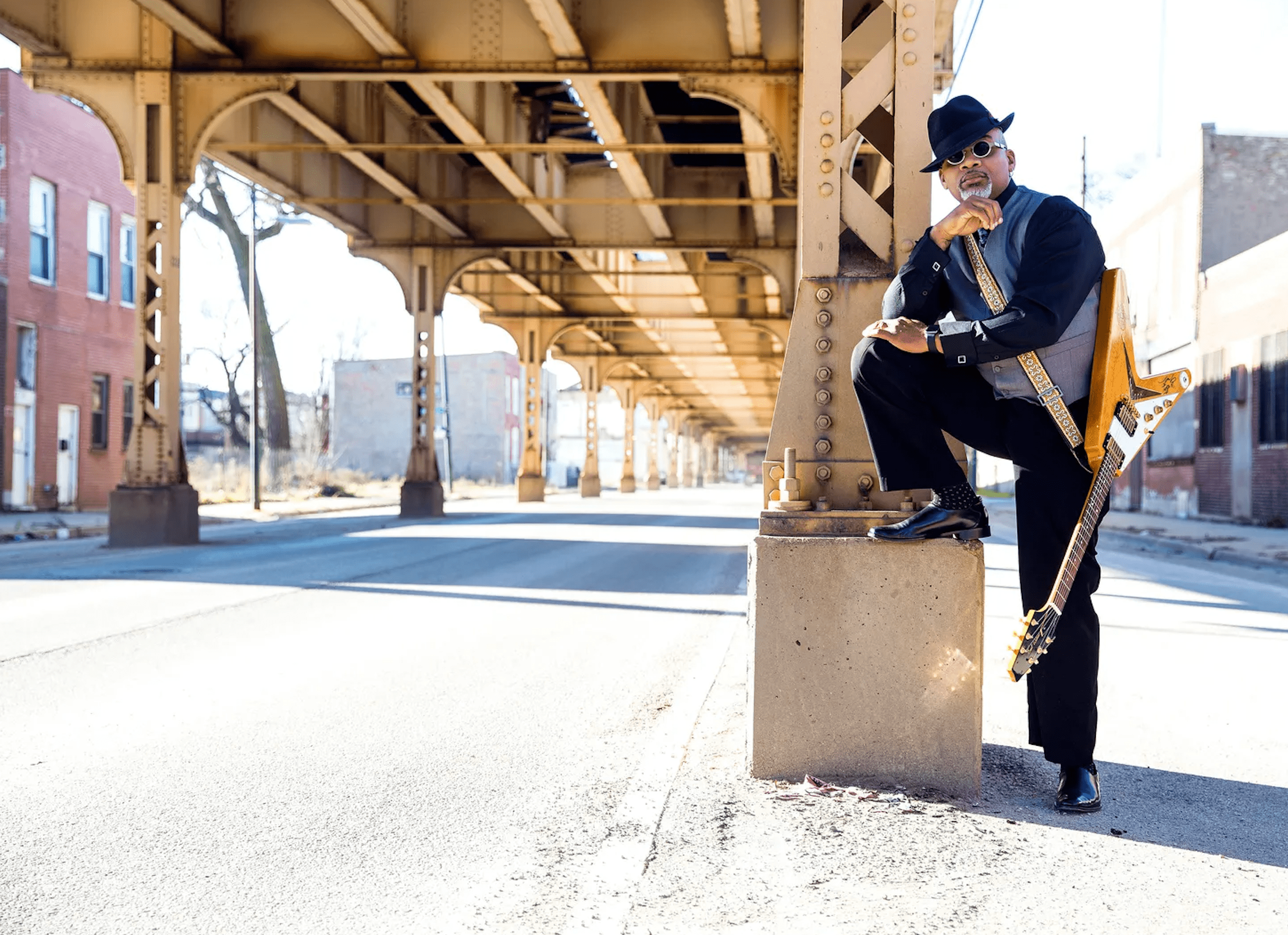
Singer/guitarist Toronzo Cannon is well known as one of the premier musicians in the contemporary Chicago blues scene. What is almost as well-known is the fact he drove a CTA bus for 27 years, even after his music career took off. In September 2020, a few months after the COVID-19 pandemic hit Chicago, he retired from his job as a bus operator.
Nowadays you are more likely to see him zipping around town on an electric unicycle, which he started doing when his car wouldn't start and he needed to make it to band practice on time. However, his many years of driving a bus gives him an educated viewpoint on the transit agency's current labor challenges.
He recently shared his CTA experiences with Streetsblog. The interview has been edited slightly for clarity.
James Porter: Why did you quit driving buses for the CTA?
Toronzo Cannon: I had enough years to retire. They wanted 26 years and a day – that’s how you get a pension. I was too young, technically, to get my, I guess they say, full pension, which came with insurance. I got my full insurance but I left three years early because I was just burned out, I guess. I retired legally, but I had to find my own insurance.
They tried to entice me with that, and I said I’ll find my own insurance. I was going through a divorce at the time, and I didn’t know when the smoke would clear, but I’m like, you know what? I will lose half of whatever anyway, so let me just take a leap of faith and bet on myself.

JP: Do you feel you were treated fairly by the CTA management?
TC: There’s always that manager/employee attitude. Everybody’s got a boss, so everybody’s scared to make moves. If that manager knows what kind of employee I am or what kind of operator I am, they would know: "Oh, Toronzo, he’s not gonna pass up people on the street, he’s not gonna splash water or do whatever. He shows up for work."
But that manager has a manager, and that manager has a manager, so everybody’s looking out for each other, and that’s the culture of CTA now, where everybody’s scared to say, "I know this employee, he’s not like that, we’re just not gonna put it on his record."
I think that’s how they keep the turnover rate going: They want you to breathe, but not a lot of breathing. But the fact that I was a musician got me some grace and some favor, especially when media started coming around. The managers at the garage at that time would get red tape resolved if media came down to see me, so they can get the supplies they need for the garage. They were kinda using me to get things done for their particular garage. And in turn, they would give me favor by letting me shift my dates and move my days around so I could honor my gigs if I had to go out of town.
I guess I was treated fairly in some ways, but I was kind of like a "golden child" of the garage. I did something different from what everybody else was doing and got media attention. I never used it to its full capabilities. I really didn’t want to do that.
James Porter: 99 percent of the musicians I know have day jobs, but you really leaned into that, being featured in ads.
TC: I didn’t want CTA to know what I was doing. The first thing they’re gonna think is, bluesman out late, carousing at night, drinking, not getting his sleep, driving hundreds of people around every day. I didn’t want them to know until Alligator [Records] and WGN did something with me. All of a sudden, now the jig is up. Everybody knows what I do.
At that time, I got a call from [then-mayor Rahm] Emanuel, CTA is wondering, "Okay, who is this dude that’s traveling the world? We didn’t even know he was working for CTA." People in the garage knew but the whole system didn’t. When Channel 9 [WGN] and Channel 2 [WBBM] and Channel 26 [WCIU] and Channel 11 [WTTW]... there were a bunch of people calling… some manager or some new person’s gonna try to derail my advances, because that’s how they get hired, by messing people up – some managers.
But it worked to my advantage because it’s a "feel good" story. At that time, I had over fifteen, sixteen years. I just kinda eased into it. I was just doing what I could, but then when it became a thing, I had the ear of the mayor of Chicago. If I had problems, I could have called him. He was taking my phone calls every time. But I never used that to my full advantage, because I just wanted to play my gigs and still maintain a job.

JP: Did you have any instances where CTA riders threatened your safety, particularly during COVID?
TC: Yes, I was over there on the West Side of Chicago. It was always people not wearing masks.
I didn’t like how CTA, as a company, treated its employees [during the early days of the pandemic]. Every morning, they would give us one little strip of sanitary wipes, gloves, not even a mask. They just give you this little "care kit" that you have to wipe down everything around you. At the time, we didn’t know what was going on.
And then they opened up the back door; no one was paying a fare, and everybody would be just getting on the back of the bus. Two people had died of COVID in our garage, and they didn’t even shut down the garage. We didn’t get anything like other companies were getting. Other companies, if somebody died of COVID, they would shut down everything and clean everything. That never happened [with the CTA].
I blame the union for that, [Amalgamated Transit Union] 241, they were in bed with CTA for the most part. I’ve never used the union, I just paid dues. I wasn’t that kind of employee. I came and did my job. I tell myself, I always tell my daughter too – never open the door for anybody to talk crazy to you. I’ve always did what I was supposed to do at CTA.
It wasn’t a glorious job, but I got paid for it. I was tired. I’m not Mr. CTA, so its not like I was happy to go to work every day. But I signed up to do a job, so I did it.
But I just didn’t like their practices and how they treated their employees. We were considered “essential employees” or whatever they called it, but we would go to the big-box stores and they’d say, no, we meant [firefighters] and [police] and nurses and doctors. We have a non-strike clause because CTA can close down the city. That’s pretty essential. We’re still out here taking a few people to work, but we don’t get that status.
They gave you the recognition but without the benefits. To me, it was just basics. A lot of that was going on with me, and I’m thinking: I gave them 27 years, it’s time for me to go. Whatever’s ahead of me, from this point on, if I’m sitting somewhere in a one-room country shack, after my divorce and whoever I have to pay, that’s my life. I’m willing to go forward and it is what it is. I took a chance on myself and that’s what I’m gonna do.
JP: Why do you think the CTA is having problems keeping enough bus drivers and train operators staffed right now?
TC: When I came in in ‘93, I was being trained by men and women that were from the '60s to '70s era. The people that I’ve trained now have twenty-something years. I trained them with that knowledge [of the older generation]. I don’t know how they’re being trained now. When I saw young people coming in with their pants sagging, nobody can pass the drug test, the people that do still have a certain mentality of "I can quit and go to another job" or "I’m gonna go somewhere else and drive a truck"... I don’t know if its the mentality of the young people, that they don’t take it seriously, or they have this thing now called "quiet quitting" where young people do the least amount of work, they try not to go above and beyond the call of duty like I was taught… just little things like you let the passengers get on the bus first, don’t go into a place that sells liquor or alcohol with your badge number exposed. It’s an ethics thing.
JP: Any suggestions on what the agency should do to have more success retaining and recruiting workers?
TC: I would say, vet a little bit better. I know it might be slim pickings because not a lot of young people are taking jobs seriously, but maybe vet a little bit more. Now I understand they’re giving thousand-dollar signing bonuses.
The union, a lot of those guys, they were bus drivers, they got up there and lost themselves. They forgot who they were. You give a chump a title, and now they don’t know how to act. Now he forgets where he came from. He doesn’t have to worry about being fired. But if you schmoozed him enough, and have little parties… the president of the union, Keith Hill…to me he’s a snake. You can put that all on the record. He’s a snake to me. He used to throw little "all white" parties for part-timers and people of the CTA, so they think he’s cool.
So when it came time to vote for a union position, oh, they’re gonna vote for their friend Keith! He gets up there and just basically [doesn't] look out for the union as a whole. He just looks out for his “friends.” He kinda does the Mayor Daley thing, you know what I mean? And I’m sorry to say this about Black men, the CTA and the union, but they mostly have a high school education, maybe some college. You think you’re gonna take your ass down to Springfield and lobby and deal with those seasoned, older white guys that went to college and they do this for a living? You think you’re gonna go down there and try to schmooze those lobbyists just because CTA gives you some per diem? They don’t care about you. They don’t care about your little unions. The union needs to be overhauled and changed; it needs to be a little more forceful. And not just when bus drivers mess up.
View a list of Toronzo Cannon's upcoming blues performances here.

Did you appreciate this post? Please consider making a tax-deductible donation.




